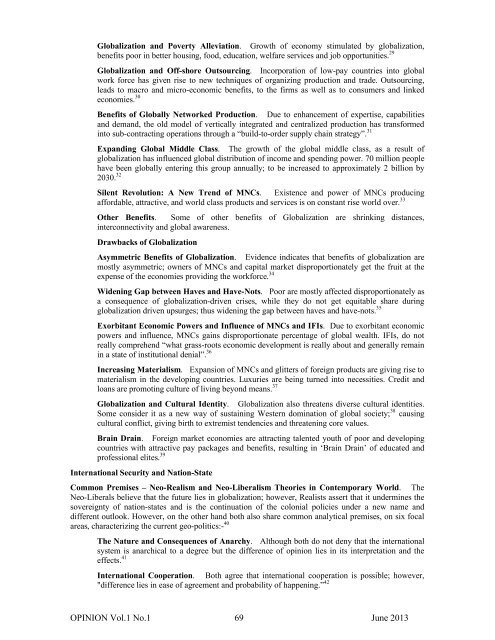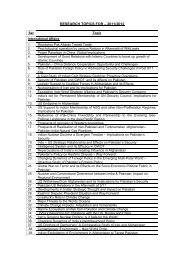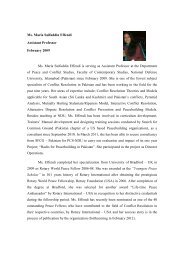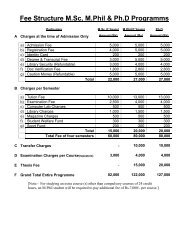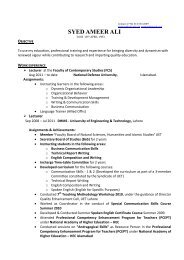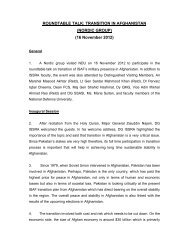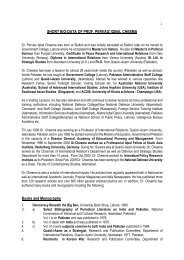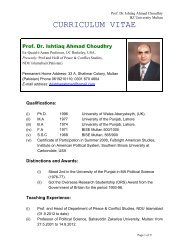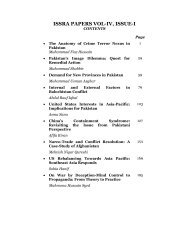OPINION Vol.1, No.1 June 2013 - National Defence University
OPINION Vol.1, No.1 June 2013 - National Defence University
OPINION Vol.1, No.1 June 2013 - National Defence University
Create successful ePaper yourself
Turn your PDF publications into a flip-book with our unique Google optimized e-Paper software.
Globalization and Poverty Alleviation. Growth of economy stimulated by globalization,<br />
benefits poor in better housing, food, education, welfare services and job opportunities. 29<br />
Globalization and Off-shore Outsourcing. Incorporation of low-pay countries into global<br />
work force has given rise to new techniques of organizing production and trade. Outsourcing,<br />
leads to macro and micro-economic benefits, to the firms as well as to consumers and linked<br />
economies. 30<br />
Benefits of Globally Networked Production. Due to enhancement of expertise, capabilities<br />
and demand, the old model of vertically integrated and centralized production has transformed<br />
into sub-contracting operations through a “build-to-order supply chain strategy”. 31<br />
Expanding Global Middle Class. The growth of the global middle class, as a result of<br />
globalization has influenced global distribution of income and spending power. 70 million people<br />
have been globally entering this group annually; to be increased to approximately 2 billion by<br />
2030. 32<br />
Silent Revolution: A New Trend of MNCs. Existence and power of MNCs producing<br />
affordable, attractive, and world class products and services is on constant rise world over. 33<br />
Other Benefits. Some of other benefits of Globalization are shrinking distances,<br />
interconnectivity and global awareness.<br />
Drawbacks of Globalization<br />
Asymmetric Benefits of Globalization. Evidence indicates that benefits of globalization are<br />
mostly asymmetric; owners of MNCs and capital market disproportionately get the fruit at the<br />
expense of the economies providing the workforce. 34<br />
Widening Gap between Haves and Have-Nots. Poor are mostly affected disproportionately as<br />
a consequence of globalization-driven crises, while they do not get equitable share during<br />
globalization driven upsurges; thus widening the gap between haves and have-nots. 35<br />
Exorbitant Economic Powers and Influence of MNCs and IFIs. Due to exorbitant economic<br />
powers and influence, MNCs gains disproportionate percentage of global wealth. IFIs, do not<br />
really comprehend “what grass-roots economic development is really about and generally remain<br />
in a state of institutional denial”. 36<br />
Increasing Materialism. Expansion of MNCs and glitters of foreign products are giving rise to<br />
materialism in the developing countries. Luxuries are being turned into necessities. Credit and<br />
loans are promoting culture of living beyond means. 37<br />
Globalization and Cultural Identity. Globalization also threatens diverse cultural identities.<br />
Some consider it as a new way of sustaining Western domination of global society; 38 causing<br />
cultural conflict, giving birth to extremist tendencies and threatening core values.<br />
Brain Drain. Foreign market economies are attracting talented youth of poor and developing<br />
countries with attractive pay packages and benefits, resulting in ‘Brain Drain’ of educated and<br />
professional elites. 39<br />
International Security and Nation-State<br />
Common Premises – Neo-Realism and Neo-Liberalism Theories in Contemporary World. The<br />
Neo-Liberals believe that the future lies in globalization; however, Realists assert that it undermines the<br />
sovereignty of nation-states and is the continuation of the colonial policies under a new name and<br />
different outlook. However, on the other hand both also share common analytical premises, on six focal<br />
areas, characterizing the current geo-politics:- 40<br />
The Nature and Consequences of Anarchy. Although both do not deny that the international<br />
system is anarchical to a degree but the difference of opinion lies in its interpretation and the<br />
effects. 41<br />
International Cooperation. Both agree that international cooperation is possible; however,<br />
"difference lies in ease of agreement and probability of happening.” 42<br />
<strong>OPINION</strong> <strong>Vol.1</strong> <strong>No.1</strong> 69 <strong>June</strong> <strong>2013</strong>


